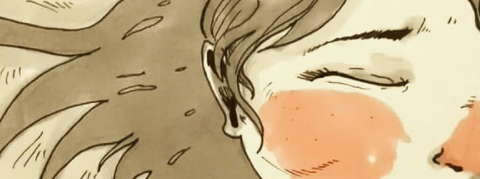Murakami’s After Dark lasts for the duration of a single night in the centre of Tokyo. The pages are a-buzz with the perpetually busy city. But at night, a different kind of crowd begin to dominate the streets and a series of closely-knit, but independent, events unfurl. With the action sharply divided by frequent chapters from the perspective of a young woman who had been asleep for several months, we cannot help but imagine if the whole plot is a dream (it certainly feels like it).
After Dark’s dream-like nature is only reinforced by the fact that, often, the reader only receives fragments of information during a scene: until – suddenly – there are dramatic links between stories, as in a dream when the isolated episodes begin to blend together so that afterwards we are left with a simple incredulity: how could I not tell this was a dream?

With one narrative slowed down to the sleeping heart-rate of Eri Asai, and the other charged with the increasing momentum of events surrounding her sister Mari (who is awake and out in the city), After Dark prompted me to consider the correlations between Sleep and Time.
Eri Asai’s constant, sleeping form poses a metaphor for Relative Time. Throughout After Dark, Eri acts as a reference point for the passage of time in the novel. The events of the night speed up and combine and separate as ideas of causation and coincidence are forced upon the reader: Was it inevitable that the events ended up this way, influencing each other? We lose track of time whilst reading as the plot thickens and we discover new connections. We don’t know, in the beginning, that Mari is the younger sister of Eri Asai. We are simply guided back and forth between their narratives by a very omniscient narrator, strikingly familiar to ourselves.
There is a theory of time in which the flow of time is not an objective reality, but is something projected onto reality by our experience of it (Smith, 2016). In After Dark, we are forced to keep track of time at the beginning (and end) of every chapter: chapter numbers are accompanied by the image of a clock, on which we watch time slowly move forwards. I realise how much I appreciated this as I read, how I could better imagine the plot alongside these time-references. How have I managed to immerse myself in books without this fictional guidance? I wondered.
But this is exactly the issue at hand: normally, frequently without any guidance at all, we superimpose a timeline onto fiction. We wait for some cues to confirm this “The next day” or “three years later”, but if these fail, we – the reader – become the reference point to time. As we read the dialogue, the dialogue is performed in our heads. In After Dark, Murakami takes this control from us; we are kept to a strict series of events, happening in a predetermined timeframe. And this is why I felt so reassured when the events slowly pushed and influenced each other, time was being set out for us so nice and orderly.
And yet, this aid to immersion further distances us from any narrative involvement: time is taken from our hands. We become like the sleeping Eri Asai, cared for and unchanged by what happens elsewhere in the city, at night, after dark. The narrative lens Murakami provides – the ‘camera’ he describes us as looking through as we watch Eri sleep, even the ‘bird’ flying over the city in the very opening chapter, viewing all from above – forces us to reflect upon our own involvement in time… wondering whether time is perhaps dependent on this involvement.
“In both that room and this room, time is passing at
the same uniform rate. Both are immersed in the same
temporality. We know this from the occasional slow rising
and falling of the man’s shoulders. Wherever the intention
of each might lie, we are together being carried along the
same speed down the same river of time”
—-
[1] Smith, Nicholas J.J., “Time Travel”, The Stanford Encyclopedia of Philosophy (Spring 2016 Edition), Edward N. Zalta (ed.), URL = https://plato.stanford.edu/entries/time-travel/.
[2] Murakami, Haruki, After Dark (London, Vintage, 2008)